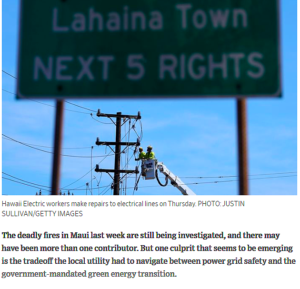Fossil Fuel Interests; organized, powerful, influential
An Open Letter – updated
I received an email earlier today from a friend, a fellow full-time Hawaii resident, and community activist.
She expressed her concerns regarding a recent Wall Street Journal article, and her inability to access the full article and post a comment.
She asked if I would respond to the article. As tempting as the request was, I too do not subscribe to the WSJ or for that matter any other Murdoch publication or media outlet for reasons all too obvious to many Beyondkona subscribers. So I will attempt fulfill her request with the following response…

Today’s media generally falls into three categories:
- investigative reporting; with the goal to reveal and educate the public on issues of importance
- reporting & entertainment co-mingled, generally with an issue and/or agenda contained within the factual content
- propaganda, in the name of news and designed to serve an audience generally predisposed as in “my mind is made up”; no room for counter opinions or thought
For the record, we consider BeyondKona’s reporting and content to fall within the first category, but at times it may slip into the second.
My friend’s concerns are more than just valid, they are spot-on as some might say. The WSJ article used the tragedy in Lahaina to elevate and conflate its anti-clean energy / pro-fossil fuel agenda by loosely connecting the Maui fires with President Biden’s clean energy policies (btw, the Republican party doesn’t have one, expect to slow or stop any American-led meaningful transition to a clean energy economy).
If Hawaiian Electric’s grid management practices were purely incidental in terms of a potential connection as a source of the Maui fires, or when and if such a connection were to be proven to be false, even then WSJ article which asserts a Maui fires-grid connection, Wis really the fault the of Biden Administration’s clean energy policies, not the utility’s grid management practices, it is still a leap of faith to accept their reasoning.
The forces behind fossil fuels forever
The fossil fuel sector, as a global industry is extremely wealthy, and certainly embedded in the global economy and within governments around the world. In 2022, this group of stakeholders, adjusted for inflation, receives each year (according the World Bank and IMF reports), in excess of 6.5 Trillion dollars (USD) in global taxpayer subsidies.
Oil, Gas, Coal producers, and other FF stakeholders, include, but not limited to:
1- Saudis, joined by the Gulf oil states
2- US-Euro, and Canadian Oil-Gas interests
3- Russia, which is a master at influencing digital and conventional media outlets and minds
4- FF agents; from PACS and their money and influence directed at media channels and digital megaphone outlets (e.g., WSJ) — NPR reported earlier in the week how FF money is now pouring into TikTok for kids, brainwashing the young as to the all-saving role fossil fuels play in their lives as they grow up — insidious
5- Political Agents: the entire Republican Party to start with, and select oil-gas-coal state Democrats; e.g.; Joe Manchin
These are examples of the powerful influences that impact societal thought, policy, politics, and media from the traditional to the digital world; the internet to social media outlets.
The FF influence machine is now focused on climate responses impacting the energy status quo, as in delaying clean energy implementation actions, creating doubt where none exists, while obstructing the intent and delaying any meaningful transformational energy market reforms — everything from energy production to sales and demand.
In short, the fossil fuel sector sees clearly — a growing market reality that they face: death by thousand cuts. Like a wounded animal, Gas, Oil and Coal interests are responding with all means at their disposal, which by any measurement is substantial.
So the WSJ article is not surprising considering the source and the “all hands on deck” Wall Street panic now underway within the fossil fuel economic sector as to their future on hold on energy markets.
It is not difficult to connect the dots between these forces and the increasing all-out, but subtle attacks on the clean energy sector. Shell’s CEO in a recent BBC, shocked viewers with his predictions that oil and gas will continue to be around and vital to the energy economy for the foreseeable. Shell’s Chief Executive Officer, Wael Sawan told the BBC audience he in fact foresees increases in global demand for fossil fuels through the 21st century, not less to little as many expect.
The spread of climate policies across the developed world, and the economic response to changes these policies promote are directed towards economic, climate, and overall societal benefit factors which are difficult to deny, even for big oil.
But we are also talking about an extremely wealthy and powerful fossil fuel sector. Fossil energy sector has been a fundamental driver of the technological, social, economic and development progress which has followed for over 150 years. Fossil fuels (coal, oil, gas) have, and continue to, play a dominant role in global energy systems. But the negative impacts long since have the point sustainability or balance with the Earth’s biosphere, and most specifically climate impacts and its fundamental modification as greenhouse gas emission continue to rise and levels already stored in the atmosphere, ocean, and soil when burned they produce the lasting effects pf carbon dioxide (CO2), the largest driver of global climate change. Another liability fossil fuels carry with their use is as a major contributor to local air pollution, which has been linked to millions of premature deaths each year.
Yet, oil and gas stakeholders have a long history of starting and feeding misinformation wars. Most notable, initializing global warming denial campaigns dating back to the early 1980’s. With reality of science and common observations, the industry outlets have switched to a new information strategy in their messaging; from denial-to-delay. This no happening in guise of cautious climate team player influencing global reforms and energy policy. This strategy switch is now focused on slowing down to a crawl any meaningful transition to a clean energy economy initiatives in commence, policy, and regulatory oversight. Fossil fuels interests are increasingly focused on messaging fundamentals to discredit proven clean energy solutions they neither own or control, while promoting wild and often impractical ways with any accountability towards addressing climate issues they help to create, and continue to enable.
- On whole, the future of fossil fuels and their replacement by clean zero emissions energy alternatives is well underway, out of the lab and now mainstream in both electricity and transportation sectors — and that is laying the foundation for a global transition to economic and societal electrification.
At the same time, the broader public is now beginning to embrace the science of climate change (the facts increasingly are just to difficult to ignore or deny). Many clean energy replacement solutions are already in place, and their clean energy cost performance and reliability is now gaining marketplace momentum within the electricity energy sector. Yes, there is, and always will be, a subset of society beliefs or lifestyle reaffirming a mantra of “my mind is made up, don’t confuse me with facts” … but that entrenched minority will not and cannot hold back the tide of change now underway, whether it is the right thing to do or more cost effective. The end result will be the same — the slowing and eventual balance of greenhouse gas emissions being released into the global environment.
IRA to the Rescue
For the fossil fuel sector, right now there is one policy that generates clear response, that is President Biden’s highly successful (so-called) Inflation Reduction Act or IRA, a more appropriate title could have been Clean Energy Act. The few brave Republicans in the Senate needed to pass the bill insisted on a bill title that would be less telling, providing political cover, and was certainly less innocuous to their party’s fossil fuel benefactors.
The IRA bill’s first birthday since its enactment on August 16, 2022 was celebrated outside the fossil fuel sector. The bill’s success has been undeniable s based on its clear-cut objectives, and the fulfillment of objectives based on American ingenuity and the Country’s historic manufacturing prowess. It is a win-win for the nation and the planet.
The IRA’s large and lasting tax credits and subsidies are focused on clean electricity (from wind, solar, nuclear, geothermal, and battery energy storage), coupled with tax credits for electric vehicles. In less than a year, the IRA prompted investment in a massive national buildout of battery and EV manufacturing across the states.
- Nearly 80 major clean energy manufacturing facilities have been announced, an investment equal to the previous seven years combined, according to the American Clean Power Association.
- The legislation has already created 170,000 clean energy jobs and is projected to create some 1.5 million jobs over the next decade, while significantly cutting the nation’s carbon emissions.
- The legislation is already shifting the production of critical clean energy components away from China and into the United States.
While the biggest impacts will begin in 2024 and 2025, there have been more than 270 new clean energy projects announced since its passage, with investments totaling some $132 billion, according to the Bank of America.
Roughly half of those investment dollars are going to electric vehicles and batteries, while the rest are going into clean and renewable energy sectors e.g., solar, wind, and batteries. These clean and sustainable energy investments are expected to be generate over 86,000 jobs, including 50,000 jobs related to BEVs.
Earlier this week, Moody’s said the legislation is likely to support growth in gross domestic product, productivity, and innovation.
“Over the past year, there have also been signs that the IRA legislation is now contributing to a surge in clean energy manufacturing and related industries such as semiconductors, and factoring into companies’ investment decisions, including in the auto, utilities and oil and gas sectors,” Moody’s said.




Aloha Bill,
Sent you a private email with two WSJ articles from this past week. Not sure which one was at issue. You might want to read them before commenting on them. I found them to be quite fair and poignant. They were also well referenced as the WSJ usually does.
Don
Thanks, Don for your comment, and for sharing WSJ articles in question. I believe it is fair to say WSJ’s editorial bias is well established, and even more so with its recent change in ownership. Perhaps the same could be said for BeyondKona. Either way, the WSJ has repeatedly demonstrated it is no fan of the Biden administration’s push to transform the United States’ energy matrix into a clean energy economy. We support that initiative and believe at this time WSJ does not.
Examples include the two WSJ articles you provided in your email, and thank you again for the information.
In the WSJ Opinion article dated August 19th; “Utilities are spending more on the green energy transition than resilience”. the article premise sets up a false choice between renewable energy replacements and resilience, both are inherently linked. The second referenced WSJ article you provided; “Utility Knew Wildfires Were Threat”, we do not have an issue with, the Maui fires and the results speak for themselves.
Rather our editorial response is in reference to a third WSJ article not provided in your examples, (see the Journal’s picture caption in our story; “…one culprit seems to be emerging is the tradeoff the local utility (HE) had to navigate between power grid safety and government-mandated energy transition” — here again WSJ sets up another false choice premise we could not let go unchallenged.
Thanks Bill. Good article and summary of the situation. I would just observe here that the ‘death by a thousand cuts’ metaphor impacting the fossil fuel industries may be apt but not a complete enough picture. Since the new century began we have seen the dueling parties and administrations vying for hearts and minds vis-a-vis the ‘existential threat’ or ‘fortunate domestic security’ imbued by the FF empire. Only twice did the Dems radically succeed by waging all or nearly all of their political capital against this powerful interest. But in Obama’s terms, he tried rather half heartedly to take on the industry, but more importantly sought to parlay his short hand of legislative power on the equally colossal and impactful health care industry; to wit we got ‘Obama care’ as his lasting legacy.
In Biden’s times, when he also had a short hand in terms of a very slight legislative majority at the beginning of 2021, he broke through with the IRA act by votes of Dems only. Now it proves to be highly consequential in lifting up the needed technologies to out-compete fossil fuels.
As in the Wizard of Oz fable, Dorothy learned she always had the power to change or take flight back to Kansas right at her feet…the ruby slippers!
In light of these times, and the continuing threat posed by human caused atmospheric burning, knowing what to do with the ‘ruby slippers’, we already have on our feet, is truly game changing, and might prove out that ‘Dark Brandon’ is truly a Wizard of Odds. 😉
Don’t be so fast to group “geothermal” or “enhanced geothermal” as a clean green industry. They use the same equipment as oil and gas, they drill down miles into the earth and cause induced seismicity with their operations, same as fracking industry and injection of their waste water.
Geothermal wells fail and have to be re-drilled, geothermal resources go cold and more wells have to be drilled. It is no better than oil and gas, and they poison the communities with Hydrogen Sulfide, a deadly gas.
Here in Puna, Hawaii, we have been gassed 70 times in the last 30 years, and then a volcanic eruption broke out at the site of the plant, who had been circulating 6 million gallons a day of effluents with added chemicals to prevent silica and scale. Low and behold, when we researched, their 1987 Environmental Impact Statement warned of induced seismicity by claiming earthquakes up to M4 are caused by injection wells – but that is not seen as a problem in Hawaii….
Instead of investigation of induced seismicity and the actions of PGV during the eruption, Governor Ige issued an Emergency Declaration to allow PGV to bypass all proper channels of issuing permits and denied us a contested case, and has allowed PGV to operate without performing an Environmental Impact Statement
Aloha Sara, there is but one citation in the subject article on geothermal, and that in reference to IRA tax credits, not an endorsement of the energy source or sector it represents. The IRA’s large and lasting tax credits and subsidies are focused on clean electricity (from wind, solar, nuclear, geothermal, and battery energy storage), coupled with tax credits for electric vehicles. In less than a year, the IRA prompted investment in a massive national build out of battery and EV manufacturing across the states.
Today, “geothermal” qualifies as a “renewable energy source” regardless of its climate, environmental and community consequences. Our June 2023 guess article on the subject of Geothermal energy in Hawaii, and more specifically PGV, is one example of our reporting on the subject. I recommend it.
https://www.beyondkona.com/geothermal-the-good-bad-and-the-ugly/